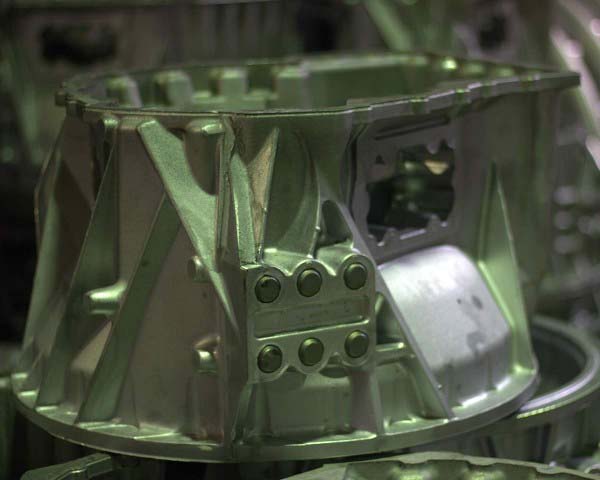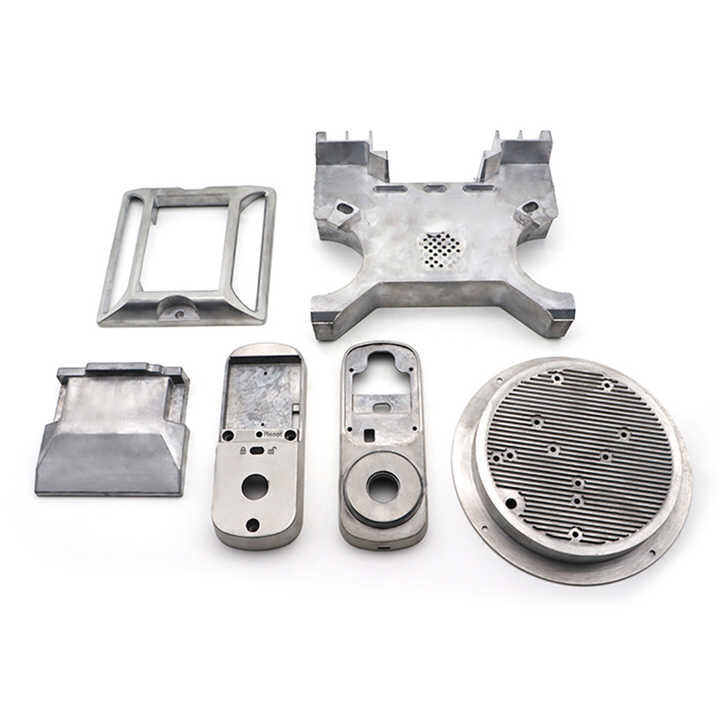Top reasons why aluminum casting remains valuable for multiple industries
Just How Light Weight Aluminum Spreading Contributes to Effective Manufacturing Solutions
Light weight aluminum spreading plays a necessary function in contemporary production. Its light-weight nature and corrosion resistance make it a favored selection for various markets. Strategies such as die casting and sand casting permit the creation of elaborate get rid of minimal waste. The combination of automation more enhances production effectiveness. The implications of these innovations extend beyond simple efficiency - aluminum casting. Understanding the wider effect exposes considerable insights right into the future of manufacturing
The Benefits of Aluminum in Production
Numerous metals are made use of in production, light weight aluminum stands out due to its special homes that improve production efficiency and item performance. Its light-weight nature especially lowers transport costs and energy requirements in numerous applications. Light weight aluminum's excellent corrosion resistance warranties long life and sturdiness, decreasing the need for constant substitutes and maintenance. This steel can be quickly molded and formed, enabling functional layout choices that satisfy particular industry requirements. Additionally, aluminum shows remarkable thermal and electrical conductivity, making it a perfect option for applications calling for effective warmth dissipation and electrical monitoring. The recyclability of aluminum likewise plays a vital duty in sustainable production techniques, as it can be reused without shedding its fundamental buildings. In general, the benefits of aluminum in manufacturing result in set you back savings, enhanced product long life, and a lowered environmental impact, making it a favored product in numerous markets.
Secret Aluminum Casting Techniques
Aluminum spreading strategies are necessary for producing high-quality parts in different making processes. The key approaches consist of sand spreading, pass away casting, and investment spreading. Sand casting involves producing a mold and mildew from sand, which permits large components and complex shapes. This method is usually favored for its cost-effectiveness and flexibility. Die casting, on the other hand, makes use of high-pressure to infuse molten aluminum right into steel mold and mildews, causing accurate, uniform parts ideal for high-volume production. Investment spreading supplies premium surface finish and intricate detail by utilizing a wax pattern that is disappeared to create the mold. Each of these techniques has particular applications and advantages, allowing manufacturers to select the most appropriate approach based upon aspects like production intricacy, volume, and material requirements. By recognizing these vital techniques, producers can enhance their manufacturing performance and guarantee the stability of their light weight aluminum elements.
Impact on Automotive Industry
As the automobile market significantly prioritizes light-weight products to boost gas effectiveness and performance, aluminum casting has actually become a critical remedy. This production process allows automakers to create intricate parts with lowered weight without compromising architectural integrity. By making use of light weight aluminum casting, producers can produce parts such as engine blocks, transmission housings, and suspension elements that are not just lighter but likewise exhibit excellent thermal conductivity and deterioration resistance.
Additionally, the flexibility of light weight aluminum casting techniques enables the production of complex styles, facilitating advancement in vehicle looks and performance. As lorries become extra highly advanced, the capability to integrate attributes like innovative safety systems and electric drivetrains ends up being essential.

Aerospace Applications of Light Weight Aluminum Spreading
Light weight aluminum casting plays a crucial function in aerospace applications by enabling the manufacturing of light-weight structural elements that enhance fuel efficiency. Additionally, the precision of aluminum casting enables the production of detailed engine parts, which are crucial for peak performance and reliability. This mix of light-weight products and exact engineering settings light weight aluminum spreading as an important modern technology in the aerospace sector.
Light-weight Architectural Parts
In the quest for enhanced efficiency and performance in aerospace applications, lightweight structural parts have actually ended up being progressively vital. Aluminum casting plays an essential function in this endeavor, giving suppliers with the capability to produce components that are both strong and lightweight. The reduced density of light weight aluminum permits substantial weight decreases without compromising structural honesty, which is important for aircraft efficiency and fuel performance. In addition, aluminum castings can be engineered to fulfill certain layout demands, making it possible for the production of complicated geometries that traditional production methods might have a hard time to attain. This flexibility not just improves production processes yet additionally contributes to general cost financial savings. As Discover More the aerospace industry remains to stress sustainability, the demand for light-weight aluminum components is anticipated to rise, further advancing advancement in manufacturing.
Accuracy Engine Components
Suppliers progressively rely upon light weight aluminum casting best site to produce accuracy engine components for aerospace applications, driven by the material's distinct residential properties. Aluminum's lightweight nature considerably minimizes general aircraft weight, improving fuel effectiveness and performance. Its excellent corrosion resistance assurances durability in rough settings, making it perfect for important engine elements. Furthermore, aluminum casting enables for detailed layouts and tight tolerances, crucial for maximizing engine performance and reliability. The spreading procedure additionally sustains automation, making it possible for suppliers to fulfill high need while preserving quality standards. As aerospace technology remains to breakthrough, the role of light weight aluminum spreading in producing accuracy engine parts will be crucial in achieving greater effectiveness and advancement in airplane style and functionality.
Sustainability and Ecological Advantages
The growing emphasis on sustainability in production has positioned aluminum casting as a leading solution for eco mindful manufacturing. This process makes use of recycled light weight aluminum, which substantially minimizes energy intake contrasted to key aluminum manufacturing. By leveraging scrap metal, manufacturers can reduce their carbon footprint and reduce waste, straightening with international sustainability goals.
In addition, light weight aluminum casting generates less damaging emissions, adding to a cleaner environment. The light-weight nature of aluminum additionally improves gas performance in transportation applications, further advertising environmentally friendly methods.
Moreover, the longevity and corrosion resistance of light weight aluminum result in longer item lifespans, lowering the requirement for frequent replacements and preserving resources. As markets increasingly focus on lasting selections, aluminum spreading sticks out as an ingenious technique that not only fulfills production needs yet likewise sustains environmental stewardship. This dedication to sustainability placements aluminum casting as a pivotal gamer in the change in the direction of Visit Your URL a greener manufacturing landscape.
Expense Efficiency in Production
Price efficiency is a substantial benefit of light weight aluminum casting, complementing its sustainability advantages - Aluminum Casting Company. The procedure of aluminum spreading enables the manufacturing of complex shapes with minimal waste, which is particularly important in a competitive manufacturing environment. Using aluminum minimizes energy prices, as it has a lower melting point contrasted to other metals, resulting in lowered power intake throughout production
In addition, aluminum's lightweight properties add to decrease shipping and taking care of prices, additionally improving general expense efficiency. The sturdiness and rust resistance of light weight aluminum cast products additionally suggest that they call for less upkeep and replacement in time, resulting in lasting financial savings for makers.
Innovations in casting technologies, such as boosted mold designs and automation, have structured production procedures, lowering labor expenses and increasing outcome efficiency. Generally, price effectiveness in aluminum casting plays a vital function in maximizing production procedures and sustaining competitive prices approaches.
Future Patterns in Light Weight Aluminum Spreading
The future of light weight aluminum casting is significantly shaped by innovations in automation and sustainable material technologies. Automation technologies are anticipated to improve efficiency and precision in the spreading procedure, while sustainable practices aim to minimize ecological impact. With each other, these trends assure to redefine manufacturing requirements and practices within the aluminum casting sector.
Automation in Aluminum Casting
Accepting automation is changing light weight aluminum casting processes, paving the method for enhanced effectiveness and precision. Automated systems simplify production by decreasing human intervention, decreasing mistakes, and enhancing throughput. Technologies such as robot arms and computer system mathematical control (CNC) devices enable constant and exact shaping of light weight aluminum parts. In addition, clever sensing units keep an eye on numerous criteria in real time, making certain perfect conditions throughout the casting procedure. This assimilation of automation not just reduces preparations yet additionally enhances product quality by preserving tighter resistances. As suppliers significantly take on these sophisticated modern technologies, the light weight aluminum spreading market is readied to experience considerable improvements in operational efficiency, cost-effectiveness, and competitiveness in the worldwide market.
Sustainable Product Innovations

Regularly Asked Questions
What Kinds Of Light Weight Aluminum Alloys Are Frequently Used in Spreading?
Frequently used light weight aluminum alloys in casting consist of 356, 380, and 413. These alloys are preferred for their exceptional fluidity, strength, and corrosion resistance, making them appropriate for a range of commercial applications.
Just How Does Light Weight Aluminum Casting Contrast to Various Other Steel Casting Methods?
Light weight aluminum casting generally uses reduced weight, superior rust resistance, and much better thermal conductivity contrasted to various other steel spreading methods. Additionally, it enables intricate styles and faster production cycles, improving general production efficiency and performance.
What Industries Benefit A Lot Of From Light Weight Aluminum Spreading?
The vehicle, aerospace, and electronic devices sectors profit most from aluminum casting. These sectors use its lightweight, corrosion-resistant properties to enhance efficiency, decrease fuel usage, and improve overall product efficiency, making aluminum casting increasingly crucial.
Are There Specific Layout Limitations With Light Weight Aluminum Spreading?
Yes, light weight aluminum casting has design limitations, consisting of constraints on wall surface density, complex geometry obstacles, and possible concerns with accomplishing tight tolerances (Aluminum Casting Company). These aspects can affect the overall toughness and functionality of the final item
Exactly How Is Quality Assurance Maintained in Light Weight Aluminum Casting Processes?
Quality assurance in light weight aluminum casting procedures is kept with rigorous assessments, adherence to standardized treatments, and using innovative modern technologies. Normal surveillance assurances dimensional precision, surface honesty, and material uniformity throughout production, advertising general dependability.
As the automotive sector increasingly prioritizes lightweight materials to boost fuel performance and efficiency, aluminum spreading has emerged as an important service. Light weight aluminum spreading plays a vital duty in aerospace applications by allowing the manufacturing of lightweight structural elements that boost fuel performance. Cost effectiveness is a substantial advantage of aluminum casting, enhancing its sustainability benefits. Accepting automation is changing light weight aluminum casting processes, leading the means for enhanced effectiveness and precision. Recycled aluminum usage has obtained grip, significantly lowering power consumption compared to main light weight aluminum production.